Latvian National Opera
拉脫維亞國家歌劇院是拉脫維亞國家 歌劇團和拉脫維亞國家芭蕾舞團的基 地,平均每樂季上演六齣新製作,一 方面以古典時期和浪漫時期的歌劇為 主,另一方面則致力推廣當代作品, 製作過不少大獲好評的巴羅克歌劇、 現代歌劇傑作、兒童演出和拉脫維 亞原創作品。拉脫維亞國家歌劇團經 常巡迴演出,又與許多優秀的客席歌 唱家、指揮和導演,還有佈景、服 裝、燈光設計師等合作,使劇團生色 不少。拉脫維亞國家歌劇院的製作一 直維持高水平,劇團對此一直引以自 豪,近期更獲提名角逐多個獎項。拉 脫維亞國家歌劇院合唱團憑着出色的 演出,獲提名角逐拉脫維亞2007年音 樂大獎。
總監 安德烈斯.薩加斯
藝術總監 阿杜爾斯.馬斯卡特斯

The Latvian National Opera House is home to both the Latvian National Opera (LNO) and the Latvian National Ballet, staging, on average, six new productions every season. While paying tribute to the traditional values of the classical and Romantic operatic works that are the cornerstones of its repertoire, the LNO continually strives to seek contemporary forms of expression. The Latvian National Opera House stage regularly resounds with successful productions of Baroque operas, modern operatic masterpieces, children’s performances and original Latvian works. LNO has an active touring schedule; many superb guest singers, conductors and directors, and set, costume and lighting designers frequently grace LNO stage. LNO takes great pride in its consistently exceptional performances, and recent award nominations are a testament to its excellence. The opera choir has been nominated for Latvia’s 2007 Great Music Award for its outstanding ensemble work.
General Director Andrejs Zagars
Artistic Director Arturs Maskats

演員
Cast
阿爾辛娜

桑露拉.維斯
Alcina Sonora Vaice
魯吉耶羅
基斯度化.安斯利
Ruggiero Christopher Ainslie
布拉達曼特
安塔拉.比格卡 Bradamante Antra Bigaca
莫格娜
伊維亞.馬田頌
Morgana Evija Martinsone
米利索
克爾揚尼斯.諾爾菲力司 Melisso Krisjanis Norvelis
奧朗特
維斯圖爾斯.揚遜斯
Oronte Viesturs Jansons
奧柏圖
艾麗奧諾拉.奧爾洛娃 Oberto Eleonora Orlova
暨 里加音樂社團
With 霍爾德斯.穆斯克斯古樂團 拉脫維亞國家歌劇院樂團 拉脫維亞國家歌劇院合唱團 「狄齊爾納斯」舞蹈團 里加舞蹈學院學生
Collegium Musicum Riga Hortus Musicus
Latvian National Opera Orchestra
Latvian National Opera Chorus Dance Group “Dzirnas” Students of Riga School of Choreography
中文字幕
Chinese Surtitles
加料節目 FESTivAl PluS
23.2.2009 ( ) 下午6:00-7:00
後台導賞參觀
巴羅克服裝及髮飾
香港文化中心大劇院後台
24-25.2.2009 (二至三) 下午6:30-7:00
演出前講座
探索巴羅克音樂與歌劇
香港文化中心大劇院
講者:安德烈斯.維斯曼尼斯(音樂總監及指揮) 阿杜爾斯.馬斯卡特斯
(拉脫維亞國家歌劇院藝術總監)
詳情請參閱藝術節加料節目指南,或瀏覽藝術節 網站:www.hk.artsfestival.org
黃奇智
Wong Kee-chee
23.2.2009 (Mon) 6:00-7:00pm
Back Stage Tour
Baroque Costumes and Wigs
Back Stage, Grand Theatre, Hong Kong Cultural Centre
24-25.2.2009 (Tue-Wed) 6:30-7:00pm
Pre-Performance Talk
Exploring Baroque Music and Opera
Grand Theatre, Hong Kong Cultural Centre
Speakers: Andris Veismanis (Music Director and Conductor)
Arturs Maskats (Artistic Director, Latvian National Opera)
For details please refer to the Festival Plus Booklet or go to the Festival website: www.hk.artsfestival.org
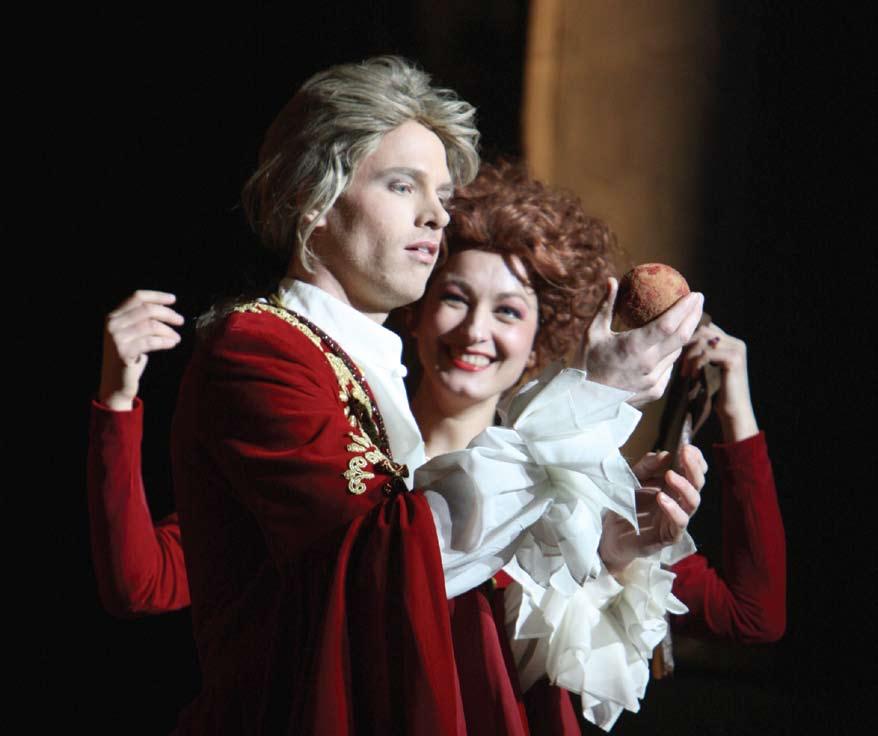
第一幕
美艷動人的女巫阿爾辛娜喜歡把浪蕩 的英雄豪傑和尋寶者騙到自己的魔法 島上,再施法將他們變成各種動植物 或石頭。騎士魯吉耶羅是她最近的獵 物,仍未被施法。
歌劇開始時,魯吉耶羅的未婚妻布拉 達曼特和她的管家米利索趕來魔法 島。布拉達曼特假扮成自己的兄弟利 徹亞度;兩人遇見阿爾辛娜的姐妹莫 格娜。莫格娜對「利徹亞度」一見鍾 情(詠嘆調〈面露微笑〉)。

Act I
The charming sorceress Alcina takes pleasure in luring wandering heroes and fortune seekers to her enchanted island, and then turning them into plants, animals and stones. Her latest captive is the knight Ruggiero, who has not yet been transformed.
The opera opens with the arrival of Ruggiero’s fiancée, Bradamante, and her governor, Melisso, on Alcina’s island. Bradamante is disguised as her brother, Ricciardo. The newcomers are met by Alcina’s sister, Morgana, who falls in love with “Ricciardo” at first sight (aria O s’apre al riso).
Morgana takes both visitors to Alcina’s palace; a party is in full swing, and some of Alcina’s captives have

島道別,儘管島上種種 光怪陸離的事情依舊縈 繞心頭(詠嘆調〈青青 的牧場〉)。
阿爾辛娜在地下魔宮裏 命令部下阻止魯吉耶羅 逃走,豈料他們不肯聽 從指示,這還是第一 趟。過去法力高強的女 巫,如今悲從中來,唱出哀歌(詠嘆 調〈青白色的亡魂〉)。阿爾辛娜睡着 了,做了許多夢,有喜有悲;一覺醒 來,法力又恢復了。
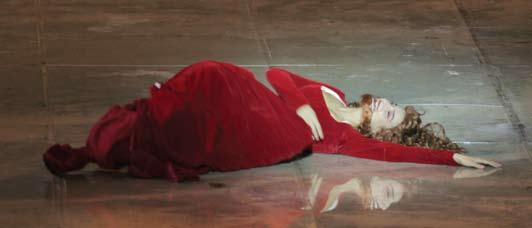
first time, they refuse to obey her. Increasing sorrow is heard in the laments of the once-mighty sorceress (aria Ombre pallide). In her sleep, Alcina has dreams, both bad and good, and her strength is renewed.
— Interval — — 中場休息 —
第三幕
奧朗特假裝對莫格娜不瞅不睬,迫使 她承認自己愛他。阿爾辛娜見到魯吉 耶羅,發現他對布拉達曼特忠貞不 逾,誓言報復,宣稱只要魯吉耶羅回 到她身邊,就既往不究(詠嘆調〈當 你被鎖上腳鐐再回來時〉)。
奧朗特來報,阿爾辛娜的戰士失去法 力;阿爾辛娜深知大勢已去,法力、 領土都難以保存(詠嘆調〈我只剩下 眼淚〉)。奧柏圖出場。阿爾辛娜命令 他殺死島上一頭生物,還遞上自己的 佩劍。奧柏圖認出那是自己的父親, 遂倒戈威脅阿爾辛娜。
阿爾辛娜懇求魯吉耶羅和布拉達曼特 放過自己,被對方拒絕(三重唱〈不 是愛〉)。魯吉耶羅只肯放過奧朗特。
阿爾辛娜姐妹倆繼續求情,但魯吉耶 羅兩人毫不讓步。魯吉耶羅解除阿 爾辛娜的魔法,島上一眾受害人(包 括奧柏圖父親)遂回復人身,再吐 人言。
Act III
Oronte pretends to be indifferent to Morgana prompting her to confess her love for him. Alcina meets Ruggiero and, finding him adamant in his love for Bradamante, vows vengeance. Ruggiero will be forgiven if he returns to her (aria Ma quando tornerai).
Oronte reports to Alcina that her warriors have lost their magic powers. Alcina senses the inevitable loss of her powers and her realm (aria Mi restano le lagrime). Oberto appears on the scene. Alcina orders him to kill one of the creatures and gives him her sword. The boy recognises his father and threatens Alcina.
Alcina pleads with Ruggiero and Bradamante for mercy, but is denied (terzetto Non è amor). Ruggiero grants freedom only to Oronte. Alcina and Morgana continue to appeal for mercy, but Bradamante and Ruggiero are unrelenting. Ruggiero strips Alcina of her powers, and the transformed travellers (Oberto’s father among them) regain their speech and their true forms.

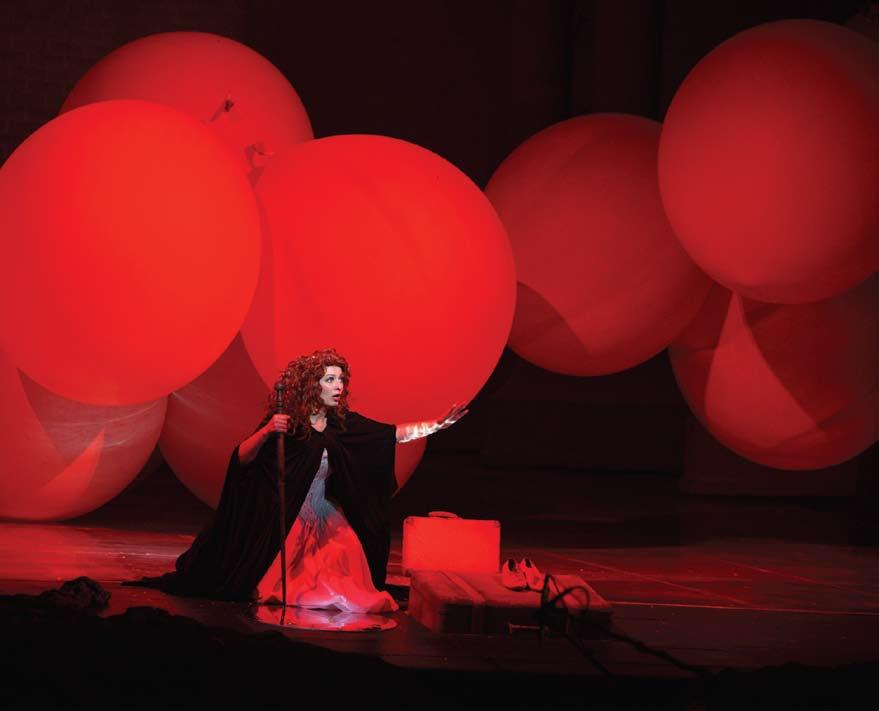
韓德爾有變色龍一樣的能力,任何國 家的特色到了他手上,統統變成「韓 德爾式」,令人渾然不覺他本是德國 人──這是他成功的基礎。
要是說《阿爾辛娜》本來的對象是王 侯將相,那麼我們今日就把它獻給普 通人,讓大家透過音樂及其精神,品 味貴族的感覺。

like ability to take any national characteristics and make them “Handelistic”, without leaving a trace of his German provenance, is the strongest basis of his success.
If this music was once written for kings and lords, then today we dedicate it to average people who wish to feel like aristocrats through this music and its spirit.


桑露拉.維斯 Sonora Vaice
阿爾辛娜 女高音
Alcina soprano
桑露拉.維斯1992年於拉脫維亞音樂學院畢業,受業於露德米拉.布勞娜教 授。1991至1995年間為拉脫維亞國家歌劇院獨唱歌手。1995年起轉為自由 藝術家。她曾獲多個國際歌唱比賽獎項,包括1992年於里加舉行的楊尼斯. 美汀斯國際聲樂大賽大獎,同年再奪於聖彼得堡舉行的波羅的海之星比賽大 獎,又兩奪拉脫維亞音樂大獎 (1996及1998),曾兩度打入杜鳴高世界歌劇大 賽半準決賽(1995及1997),以及1997年英國廣播公司卡迪夫世界歌唱大賽半準決賽。
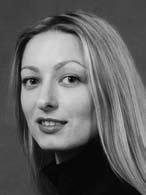
維斯足跡遍及奧地利、德國、意大利、瑞典、波蘭、法國、澳洲、希臘及中國。演出角色包括唐
尼采第《拉莫美爾的露契亞》的露契亞,浦契尼《波希米亞生涯》的咪咪,莫扎特《蒂托的仁 慈》的薇泰莉亞,威爾第《茶花女》之 薇奧麗特和《弄臣》中的吉爾達。
Sonora Vaice graduated in 1992 from the Latvian Academy of Music where she studied under Professor Ludmila Brauna. She was the soloist at the Latvian National Opera from 1991-95. Since 1995, she has worked as a freelance artist. She has won several prizes at international singing competitions including Grand Prix of the Jānis Mediņš International Vocalists Competition in Riga (1992), Grand Prix at The Stars of the Baltic Sea Competition in St Petersburg (1992) and the Latvian Great Music Award (1996, 1998). She was the semifinalist in Placido Domingo’s Operalia (1995, 1997) and at the BBC Cardiff Singer of the World (1997). She has performed in Austria, Germany, Italy, Sweden, Poland, France, Australia, Greece and China. Her repertoire includes Donizetti’s Lucia (Lucia di Lammermoor), Puccini’s Mimì (La Bohème), Mozart’s Vitellia (La clemenza di Tito), Verdi’s Violetta (La traviata) and Gilda (Rigoletto), and Handel’s Alcina among others.
基斯度化.安斯利 Christopher Ainslie
魯吉耶羅 高男高音 Ruggiero countertenor
基斯杜化.安斯利早年在開普敦擔任詩班歌手,移居倫敦後入讀皇家音樂學 院,2007年以優異成績於該校研究生課程畢業,也曾隨馬克.特克、保羅. 法林頓和奧黛麗.海蘭德學習,並於國際著名場地演出。
安斯利繼2007年在韓德爾歌唱比賽贏得米高.奧利佛獎後,2008年又在威格 摩爾演奏廳贏得理查.陶貝爾獎,並成為首位獲此殊榮的高男高音。他2007
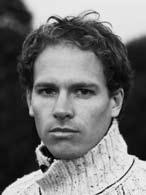
年在倫敦韓德爾節上演的《印度國王普魯斯》飾演普魯斯,大獲好評;其他飾演過的角色包括米 多洛(韓德爾《奧蘭度》)、阿爾薩切(韓德爾《帕爾泰諾佩》,法國阿佐里亞列斯歌劇節)、阿薩 梅內斯(《薛西斯》,愛丁堡藝術節)和精靈(浦塞爾《狄多與阿尼亞斯》,南非斯坦倫布什斯帕亞 露天劇場)。
安斯利未來的演出包括在韓德爾故居博物館舉行演唱會(與哈里.拜克特和英國協奏團合作)和 在布列頓《魂斷威尼斯》演出阿波羅之聲音(里昂歌劇院)。
Christopher Ainslie started his singing career as a chorister in Cape Town. After moving to London he attended the Royal College of Music and completed his postgraduate studies with distinction in 2007. He studies privately with Mark Tucker, Paul Farrington and Audrey Hyland and performs at international leading venues.
Ainslie was the first countertenor to win the Richard Tauber Prize at Wigmore Hall (2008). He also won the Michael Oliver Prize in the 2007 Handel Singing Competition. His performance in the title role of Handel’s Poro at the 2007 London Handel Festival was highly acclaimed. Other opera roles include Medoro in Orlando, Arsace in Handel’s Partenope at Les Azuriales Opera Festival, France, Arsamenes in an Edinburgh Festival Fringe production of Xerxes and The Spirit in Purcell's Dido and Aeneas at the Spier open-air theatre, Stellenbosch, South Africa.
Upcoming engagements include a recital with Harry Bicket and The English Concert at the Handel House Museum and The Voice of Apollo in Britten’s Death in Venice with Opéra de Lyon.

布拉達曼特 女低音 Bradamante contralto
安塔拉.比格卡在拉脫維亞音樂學院隨露德米拉.布勞娜教授學習聲 樂,1989年畢業後加入拉脫維亞國家歌劇院,擔任獨唱歌手。1989及1992 年兩度在楊尼斯.美汀斯歌唱比賽奪魁,1995年獲頒拉脫維亞音樂界最高殊 榮──拉脫維亞音樂大獎。比格卡的曲目包括許多室樂作品和大型作品的獨 唱樂段,歌劇方面則包括鈴木(普契尼《蝴蝶夫人》)、費尼娜(威爾第《那 布果》)、芙羅拉(威爾第《茶花女》)和天使(魯賓斯坦《惡魔》)。
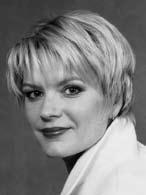
Antra Bigaca graduated in 1989 from the Latvian Academy of Music where she studied vocal studies under Professor Ludmila Brauna and became a soloist for the Latvian National Opera. She has won the Jānis Mediņš Singers Competition (1989, 1992) and in 1995 was named laureate of the Great Music Award, the highest prize given by the Latvian State in the field of music. She performs a wide range of chamber music as well as solo parts in large scale pieces. Her repertoire includes Suzuki in Puccini’s Madama Butterfly, Fenena in Verdi’s Nabucco, Flora in Verdi’s La Traviata and the Angel in Rubinstein’s The Demon.
伊維亞.馬田頌 Evija Martinsone 安塔拉.比格卡
莫格娜 女高音 Morgana soprano
伊維亞.馬田頌就讀拉脫維亞音樂學院,師隨安妮塔.格蘭扎教授,2004年 畢業,2006年獲聲樂及歌劇演唱碩士學位,在學期間參加過斯圖爾特.斯特 拉特霍德 (2005)和保羅.德.納波利(2005/06)的大師班。2005年在拉脫 維亞國家歌劇院初試啼聲,飾演加拉蒂(韓德爾《阿西斯與加拉蒂》),並獲 提名角逐年度演藝新秀獎;角色包括莫扎特歌劇的角色蘇珊娜、柏米娜和迪 斯比納、阿爾辛娜(韓德爾《阿爾辛娜》)和艾爾米瑞娜(韓德爾《雷納度》)。
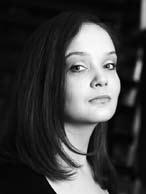
Evija Martinsone graduated in 2004 from the Latvian Academy of Music after studying under Professor Anita Garan č a. In 2006, she received a master’s degree in vocal music and opera singing. She has attended masterclasses with Stuart Stratford and Paolo de Napoli. Martinsone made her debut at the Latvian National Opera as Galatea in Handel’s Acis and Galatea in 2005 and was nominated for the Best Debut of the Year in Performing Arts Award. Her roles include Mozart’s opera roles Susanna, Pamina and Despina, as well as Alcina in Handel’s Alcina and Almirena in Handel’s Rinaldo.
克爾揚尼斯.諾爾菲力司 Krisjanis Norvelis
米利索 男低音 Melisso bass
克爾揚尼斯.諾爾菲力司1998年於拉脫維亞音樂學院畢業,師從古里.安季 波夫;1997年起已在拉脫維亞國家歌劇院擔任獨唱歌手;1999和2002年分別 贏得里加亞瑟普斯.維托爾斯國際歌唱比賽和艾爾達利斯年獎,又曾獲頒卡 拉揚獎學金,在維也納國家歌劇院擔任駐院歌手(1998/99)。他曾在奧地利 布里根茨藝術節亮相、參加過俄羅斯、愛沙尼亞和拉脫維亞的音樂節,又曾 在拉脫維亞、奧地利和日本舉行過演唱會。
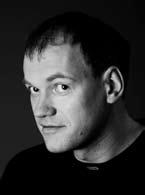
Krisjanis Norvelis graduated in 1998 from the Latvian Academy of Music after studying under Gury Antipov. Since 1997, Norvelis has been a soloist at the Latvian National Opera. He has won the International Jāzeps Vītols Singers Competition in Riga in 1999 and the Annual Aldaris Award in 2002. He received the Herbert von Karajan scholarship for a residency at the Vienna Staatsoper in 1998-99. Norvelis has participated at the Bregenz Festspiele in Austria and in festivals in Russia, Estonia and Latvia and given solo concerts in Latvia, Austria and Japan.
Dmitri Shostakovich’s 27.2-1.3.2009
演出長約3小時15分鐘,包括兩節中場休息 俄羅斯語演唱,附中英文字幕
Running time: approximately 3 hours and 15 minutes with two intervals
Sung in Russian with English and Chinese surtitles
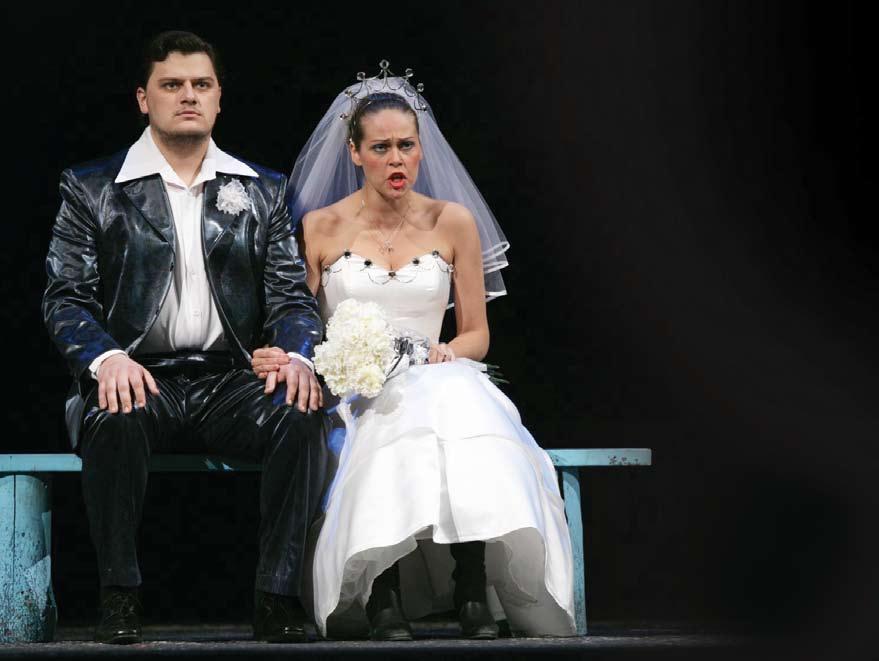
創作人員
Creative Team
音樂總監及指揮
Music Director and Conductor
導演
Stage Director
佈景及服裝
Set and Costume
燈光
Lighting
編舞
Choreography
化粧師
Make-up Artist
首席合唱指導
Principal Chorus Master

金特拉斯.林克維斯亞斯
Gintaras Rinkevicius
安德烈斯.薩加斯
Andrejs Zagars
伊娃.祖賈尼
Ieva Jurjane
克雲.維恩– 鍾斯
Kevin Wyn-Jones
艾利塔.布可夫斯卡
Elita Bukovska
英格烈達.斑得尼斯
Ingrida Bandeniece
艾格爾斯.梅利
Aigars Meri

第四場
鮑里斯睡不着,就在房子裏四處逛; 他想起自己年輕時曾在陌生女子的房 間窗外徘徊,有時甚至爬進去。他正 打算爬進媳婦臥室,卻見沙基從窗子 爬出來。鮑里斯把沙基逮個正着,還 齊集府中上下,當着卡塔里娜把沙基 打了一頓,再扔進貨倉鎖起來。鮑里 斯打人打得累了,就想吃蘑菇做晚 餐。卡塔里娜燒菜時在蘑菇裏落了老 鼠藥;鮑里斯吃過蘑菇,痛得死去活 來,卡塔里娜趁機把貨倉鑰匙取走。
鮑里斯臨終時,神父來到;卡塔里娜 對神父說,鮑里斯吃了蘑菇,許多人 吃了蘑菇都死了。
第五場
齊諾維快回家了。這讓沙基心煩,他 不想當卡塔里娜的秘密情人。卡塔里 娜一方面叫沙基放心,另一方面自己 卻苦惱萬分──她見到鮑里斯的幽靈 咒詛自己。門外傳來微弱的腳步聲; 齊諾維回來了。卡塔里娜馬上幫情夫 躲起來;齊諾維卻發現一條男裝腰 帶,就動手毆打卡塔里娜。沙基出來 跟卡塔里娜合力殺了齊諾維,然後把 屍體藏好。
第六場
卡塔里娜與沙基結婚之日,可是新娘 卻為了她所做的惡行而悶悶不樂。這 邊廂一對新人出發前往教堂,那邊廂 蓬頭垢面的農夫出場了。農夫闖入地 窖想找飲料解渴,怎料發現了齊諾維 的屍首,便跑去報警。
Scene 4
Boris cannot sleep. Wandering through the house he remembers how in his youth he would wander below the windows of unknown women, occasionally even climbing in to the rooms. He decides to climb into his daughter-in-law’s but sees that Sergey is climbing out of the window. Boris catches him and summons the household after which he beats Sergey in front of Katerina and locks him in a warehouse. Exhausted from the exertion Boris demands to be served mushrooms for dinner. Katerina doses the meal with rat poison. As the old man writhes in agony Katerina takes the keys to the warehouse from him. Katerina explains to the priest who arrives to administer to the suffering man that Boris has eaten mushrooms and that many people have died from eating them.
Scene 5
Sergey is troubled by Zinovy's imminent return. He does not want to be Katerina's secret lover. Katerina reassures him, but she herself is troubled – for she sees Boris’s ghost cursing her. Barely audible steps can be heard beyond the door; Zinovy is returning. Katerina quickly hides her lover. Spying a man’s belt, Zinovy starts to beat Katerina. Then Sergey emerges from his hiding place and together the lovers kill Zinovy and hide the body.
Scene 6
It is Katerina’s and Sergey’s wedding day. The bride, however, is gloomy anxious about the recent crimes. When the newlyweds depart for the church, a dishevelled peasant appears. Searching for something to drink, he breaks into the cellar, finds Zinovy's corpse and runs to inform the authorities.
Hidden Sexuality, Sensuality and Yearning for Happiness
文:安德烈斯.薩加斯 從導演的角度看,蕭斯達高維契的歌 劇《莫桑斯克的馬克白夫人》最使我 感興味的主要有兩點:綜觀全劇, 情感豐富的音樂推動着一股熱情的 洪流;劇情震撼有力,導演這樣一套 作品很有意思。作曲家懷着年青的感 性,卻居然能對人性有如此深刻的體 會,透徹理解人物之間的關係,實在 難得。蕭氏的音樂揭露人性深處的本 質,釋放出被埋藏的性慾、情色、和 人性中渴求快樂的本能。對我來說, 這些正是此作品引人入勝之處。
世界各地都在2006年慶祝蕭斯達高 維契的百歲冥壽,卻並非一貫「向這 位歷史上舉足輕重的作曲家致敬」的 例行活動,相反,即使在過世後三十 多年的今天,蕭斯達高維契仍具當代 意義,是次製作正好表現蕭氏的當 代性。
Text: Andrejs Zagars

尼古拉.列斯科夫的《莫桑斯克的馬 克白夫人》的故事,發生在1860年 代;由蕭斯達高維契和普雷斯所寫的 劇本切合當時的年代,但音樂部份卻 超越時代,即使是帶着俄羅斯民族色 彩的主題和語調,卻仍極具現代感。 一反傳統歌劇作品的規條──一方面 突出主角的行為帶來的衝擊,和人物 心靈的苦難,另一方面亦加以簡化和 淡化;音樂一如命運般複雜多變。劇 裏帶出生命的矛盾:當社會的「善」 往往轉化為對個人生存的「惡」,在 「善惡」的定義上的一翻掙扎;當愛 反而使人更感孤獨;當肉慾不單打擊 心靈的提昇,更把精神殘害;種種矛 盾纏繞着女主角的一生。
Two aspects of equal importance in Shostakovich’s opera, Lady Macbeth of Mtsensk, intrigue me as a director I am fascinated by the emotional music throughout which runs a current of passion, and it is interesting for me to direct such a powerful drama. The composer’s seemingly paradoxical temperament of youth united with a deeply felt depth of character and understanding of relationships is especially fascinating. Shostakovich’s music reveals something essential about the deeper layers of the human psyche, about the energy of hidden sensuality, sexuality and the instinctive yearning for happiness that lurks therein. This is what makes this work especially interesting to me.
The 100th anniversary of Shostakovich’s birth in 2006 was celebrated throughout the world. The celebration was not just a formal mark of “dignified respect for a significant historical composer”; quite the opposite is true – even now, more than 30 years after his death, Shostakovich remains contemporary. That is what we will show in this production.
Nikolai Leskov's story, Lady Macbeth of Mtsensk, is set the 1860s. The libretto of the opera, written by the composer and Alexander Preis, is true to the time. The music, however, notwithstanding the presence of folkloristic Russian motifs and intonation, sounds completely contemporary. This opera has none of the rules of the traditional operatic genre which serve to highlight but also simplify and lessen the impact of heroic actions and tribulations of the soul. This music is as complex as life itself life with all its paradoxes: the struggles to define meanings of good and evil when social good often turns into personal existential evil, when love deepens loneliness and when the sensual not only discourages the depth of the soul but actually cripples it. This is what happens to our heroine.
How does Leskov's Katerina differ from Shostakovich’s Katerina? Leskov's brilliant prose gives no insight into Katerina's existential struggles does she even have a soul? Perhaps Leskov’s story is about a yearning born of unsatisfied flesh. In Shostakovich's music we feel something entirely different we feel in 潛藏的色相、情慾及對快樂的渴求

究竟列斯科夫的卡塔里娜與蕭斯達高 維契的卡塔里娜有什麼分別呢?列斯 科夫絢爛的文辭中沒有喩示卡塔里娜 在生存上的掙扎,使人疑惑她究竟有 沒有靈魂;或者列斯科夫的故事只敘 述當肉體得不到滿足時的渴望,但蕭 斯達高維契的音樂卻給我們完全不同 的體會,我們對卡塔里娜的每個遭遇 感同身受,作曲家對女主角明確地寄 予同情,我很有共鳴,一如蕭氏,我 認為她並非另一個馬克白夫人,她並 不是一個草菅人命的冷血兇手,而是 個受害者,她在莫桑斯克的存在本身 就是一個荒謬,不但毀了眾多生命, 連自己也不能倖免;在我看來,她代 表了脆弱的女性特質,被粗暴的、 麻木的男人世界折磨;這並沒有讓卡 塔里娜得到開脫,她畢竟是個悲劇人 物,謀害他人的同時,亦必然地殺死 了自己。
既然女主角的心理這麼容易掌握, 我便打算把她的故事進一步拉近我 們。15年來,大部份的前蘇聯土地 回歸資本主義,私人企業、貿易、銀 行、貸款和股票蓬勃起來,歌劇界重 新發現奧斯特洛夫斯基、謝德林、蘇 霍沃-柯貝林等令人興味盎然的劇作, 這些都是反映十九世紀後期資本主義 發展的戲劇作品,我沿着同樣的路, 把故事搬到現代。
我想:倒不如把著名的商人鮑里斯. 季莫費耶維奇.伊茲麥洛夫塑造成現 代人──一個小鎮的商人;而把故事 的地點搬到佩塔洛沃,又有何不可? 鮑里斯是退休軍人,通過售賣非法得 來的軍事技術、偷來的軍需用品和軍 靴發了小財;現在他在海關工作,把 受賄所得投資到自己的麵包店;在這 個小城鎮,工業早被淘汰,只留下破 落的房子和以醉忘憂的居民,他的麵 包店是惟一還在掙扎求存的生意。 鮑里斯把軍營的規矩帶回家,兒子
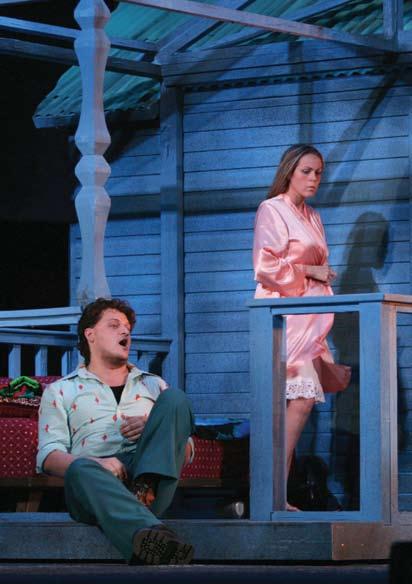
our hearts everything that happens to Katrina. The composer’s unmistakeable sympathy for the heroine is another aspect in this work to which I relate. Similar to Shostakovich, I believe she is no Lady Macbeth she is not a cold-blooded murderess with disregard for human lives. Rather, she is a victim one of those countless lives broken by the absurdity of her existence in Mtsensk. I see her as the embodiment of a fragile femininity, ground down by a rough, callous “men’s” world. This does not exonerate Katerina ultimately, she is a tragic figure murdering others, she essentially murders herself.
Because this woman is psychologically so easily understandable, I wanted to bring her story even closer. In the last 15 years when the greater part of the former Soviet Union returned to capitalism, and private business, trade, banking, mortgages and shares have flourished, theatres have rediscovered the plays of Ostrovsky, Saltykov-Schedrin and SukhovoKobylin with great satisfaction. These plays mirror the development of capitalism in the second half of the 19th century. I followed this well-trodden path and transposed the action to the present.

奧爾加.瑟爾格耶娃
卡塔里娜 (27.2, 1.3) 女高音 Katerina (27.2, 1.3) soprano
奧爾加.瑟爾格耶娃肄業於俄羅斯格涅辛音樂學院,1999年贏得艾琳娜.奧 布拉茲索娃年輕歌劇歌唱家國際大賽。1998至2000年間,她在莫斯科諾瓦 亞歌劇院擔任獨唱;2000年首次在俄羅斯大劇院演出,飾演阿依達(《阿依 達》),同年加入馬林斯基歌劇團;2001年憑費夫朗妮亞一角獲頒聖彼得堡 戲劇界最高榮譽的金索菲特獎。曾於多所知名歌劇院演出,並與著名樂團合 作,包括大都會歌劇院、夏特雷歌劇院、倫敦交響樂團和巴黎交響樂團。
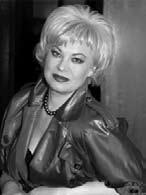
演出角色包括娜斯塔西亞(《女妖》)、麗莎(《黑桃皇后》)、馬克白夫人(《馬克白》)、艾米利亞 (《假面舞會》)、阿依達(《阿依達》)、杜蘭朵(《杜蘭朵》)以及《齊格飛》和《諸神的黃昏》 的女主角。
Olga Sergeyeva studied at the Gnesins´ Russian Academy of Music. In 1999, she won the Elena Obraztsova International Competition of Young Opera Singers. From 1998-2000, Sergeyeva was a soloist at the Novaja Opera, Moscow. In 2000, she made her debut at the Bolshoi Theatre in the title role in Aida and became a member of the Mariinsky Theatre Company. In 2001, she was awarded the Golden Sofit, the highest theatre prize in St Petersburg, for the role of Fevronia. She has performed in prestigious opera houses with orchestras including the Metropolitan Opera, the Théâtre du Châtelet, the London Symphony Orchestra and the Paris Symphony Orchestra.
Her repertoire includes Nastasia in The Enchantress, Lisa in The Queen of Spades, Lady Macbeth in Macbeth, Amelia in Un ballo in maschera and title roles in Aida, Turandot, Siegfried and Götterdämmerung.
娜塔爾賈.克列斯利娜 Natalya Kreslina
卡塔里娜 (28.2) 女高音 Katerina (28.2) soprano
娜塔爾賈.克列斯利娜畢業於莫斯科伊波烈托夫──伊凡諾夫國家音樂及 教育學院,1999年加入莫斯科諾瓦亞歌劇院,以飾演天使(魯賓斯坦《惡 魔》)一角初試啼聲。演出角色包括萊爾(林姆斯基──高沙可夫《雪 娘》)、奧爾嘉(柴可夫斯基《尤金.奧涅金》)、賽塔(華格納《漂泊的荷蘭 人》)、狄多(浦賽爾《狄多與埃涅阿斯》)、馬德琳娜(威爾第《弄臣》)和 羅拉(馬斯卡尼《鄉村騎士》)。
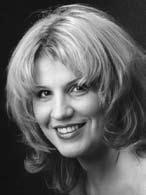
Natalya Kreslina graduated from the Ipolitov-Ivanov State Music and Pedagogical Academy in Moscow. In 1999, she became a member of the Novaya Opera in Moscow and debuted as Angel in Rubinstein’s Demon. Her repertoire includes Lel in Rimsky-Korsakov’s The Snow Maiden, Olga in Tchaikovsky’s Eugene Onegin, Senta in Wagner’s The Flying Dutchman, Dido in Purcell’s Dido and Aeneas, Maddalena in Verdi's Rigoletto and Lola in Mascagni’s Cavalleria Rusticana.
奧列格斯.奧爾洛夫斯 Olegs Orlovs
齊諾維 男中音 Zinovy baritone
奧列格斯.奧爾洛夫斯師承伊蓮娜.艾麗波娃、維吉利朱斯.諾萊卡和法蘭 科.邦妮索利,經常在愛沙尼亞和拉脫維亞各大歌劇院客席演出,飾演過 的角色包括唐.卡洛斯(《唐.卡洛斯》)、艾爾弗列多(《茶花女》)、伊斯 梅勒(《那布果》)、拉達梅斯(《阿依達》)、肯尼奧(《丑角》)、蘭斯基 (《尤金.奧尼金》)。2005年創辦了奧洛夫音樂中心,親自教授聲樂。
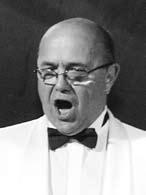


Olegs Orlovs is a frequent guest at the opera houses of Estonia and Latvia. He trained with Irina Arhipova, Virgilijus Noreika and Franco Bonisolli. His roles include the title role in Don Carlos, Alfredo in La Traviata, Ismaele in Nabucco, Radames in Aida, Canio in Pagliacci and Lensky in Eugene Onegin. He also works as a vocal coach at the Orloff Studio which he founded in 2005.
沙基.奈達 Sergey Nayda
沙基 男高音
Sergey tenor
沙基.奈達生於烏蘭烏德,在莫斯科柴可夫斯基音樂學院進修期間師隨伊蓮 娜.艾克希波娃和祖拉布.蘇特奇拉娃;1993年贏得馬利奧.德爾.莫納科 大賽冠軍並加盟聖彼得堡馬林斯基劇院。他常與基洛夫歌劇團和莫斯科大劇 院劇團合作,擔任獨唱;合作過的指揮包括格杰夫。
與奈達合作過的世界頂尖歌劇團包括紐約大都會歌劇院、巴黎香榭麗舍劇 院、巴勒莫馬西摩歌劇院、巴塞隆納里賽奧歌劇院和柏林德意志歌劇院。
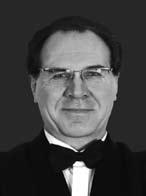
奈達去年演出過《黑桃皇后》(波恩歌劇院),又飾演過沙基(《莫桑斯克的馬克白夫人》,德意志 萊茵歌劇院)。
Sergey Nayda was born in Ulan-Ude/Sibiria and studied at the Tchaikovsky conservatory in Moscow with Irina Arkhipova and Zurab Sotkilava. In 1993 he won the Mario del Monaco competition and became a member of the Mariinsky Theatre in St Petersburg. He often performed as soloist with the Kirov Opera and the Bolshoi Theatre in Moskow under the baton of conductors including Valery Gergiev. Nayda has appeared with some of the most important opera companies in the world: the Metropolitan Opera New York, the Théatre des Champs Élysée in Paris, the Teatro Massimo in Palermo, the Gran Teatre del Liceu in Barcelona and the Deutsche Oper Berlin. In 2008 Nayda appeared in Pique Dame at the Bonn Opera and as Sergey (Lady Macbeth of Mtensk at the Deutsche Oper am Rhein.
薩姆松斯.伊久莫夫斯 Samsons Izjumovs
鮑里斯 男低音
Boris bass
薩姆松斯.伊久莫夫斯早年肄業里加扎茲普斯.梅狄恩斯音樂學院,1974至 1979年就讀於拉脫維亞音樂學院,師承古利.安提波夫教授,1978年起加 入拉脫維亞國家歌劇院擔任獨唱,1985年贏得喬治.奧特斯國際聲樂大賽 冠軍。
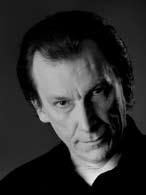
伊久莫夫斯的角色包括《阿列科》、《唐.卡洛斯》、《死之歌舞》、《基特日 城的傳說》以及《少女費朗尼亞》,足跡遍踏拉脫維亞、俄羅斯、德國、波蘭、荷蘭、英格蘭和 芬蘭。
Samsons Izjumovs trained at the Jāzeps Mediņš Riga Music College and the Latvian Academy of Music under Professor Guri Antipov. He has been a soloist at the Latvian National Opera since 1978. He was the winner of the Georg Ots International Vocal Competition in 1985. Izjumovs’s repertoire includes Aleko, Don Carlos, Songs and Dances of Death, The Legend of the Invisible City of Kitezh and Maiden Fevronya. He has participated in concerts in Latvia, Russia, Germany, Poland, Holland, England and Finland.
松耶特卡 女中音 Sonyetka mezzo-soprano
伊洛娜.巴格列2003年畢業於扎茲普斯.維托爾斯拉脫維亞音樂學院,獲碩 士學位,師承瑞吉娜.弗列貝爾格教授。她2000年在扎茲普斯.維托爾斯國 際聲樂大賽晉身決賽,2003年在拉脫維亞國家歌劇院初試啼聲,飾演塔馬拉 的保母(魯賓斯坦《惡魔》),現於陶格夫皮爾斯師範大學和陶格夫皮爾斯音 樂學院教授聲樂。
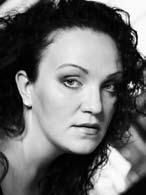
Ilona Bagele graduated from the Jāzeps Vītols Latvian Academy of Music, class of Professir Regīna Frīnberga with a master’s degree in 2003. She was a finalist of the Jāzeps Vītols International Vocal Competition in 2000. Bagele made her debut in 2003 at the Latvian National Opera with the role of Tamara’s nurse in Rubinstein’s opera The Demon. She works as a vocal teacher at the Daugavpils Pedagogical University and Daugavpils Music College.
阿列克賽.安東諾夫 Aleksey Antonov
老犯人 男低音
Old Prisoner bass
阿列克賽.安東諾夫2000年畢業於格尼辛音樂學院,同年加入莫斯科新歌 劇院,經常參與該歌劇院的音樂會,演唱選自本國和外國歌劇的浪漫曲和詠 嘆調。
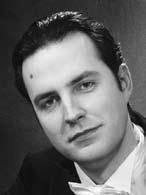
Aleksey Antonov graduated from the Gnessiny Academy of Music in 2000. The same year, Aleksey Antonov joined the Novaya Opera Theatre of Moscow. The singer has often participated in the theatre’s concerts, performing romances and arias from operas by Russian and foreign composers.
安德里斯.拉平斯
Andris Lapins

邋遢的農民 男中音
Shabby Peasant baritone
安德里斯.拉平斯1994至1998年就讀於拉脫維亞音樂學院,師承布魯諾.艾 格勒教授,畢業時獲頒歌劇演唱、音樂會演唱和音樂教學學士學位,1998年 起加盟拉脫維亞國家歌劇院,曾在拉脫維亞、英國、德國、立陶宛和奧地利 參演歌劇、音樂喜劇及其他樂種。
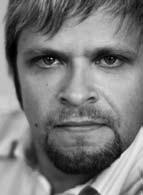
Andris Lapins studied at the Latvian Academy of Music under professor Bruno Egle from 1994-98 and received a bachelor’s degree in opera singing, concert singing and pedagogy of music. Since 1998 he has been working at the Latvian National Opera and has participated in staging various operas, musical comedies and great musical forms in Latvia, Great Britain, Germany, Lithuania and Austria.
拉脫維亞國家歌劇院樂團
Latvian National Opera Orchestra
第一小提琴
First Violins
Svetlana Okuna (concertmaster 團長)
Leonards Antonevics
Aija Frisenfelde
Jurijs Savkins
Ansis Silins
Ilze Dzenīte
Sanita Salmane
Ludmila Kalnina
Anita Balcuna
第二小提琴
Second Violins
Dace Ridina
Maija Silina
Biruta Vaivode
Ingrida Madisone
Inara Gaumiga
Gunta Redberga
Edite Markova
Dina Vanaga
中提琴 Violas
Elizabete Sorokina
Daina Karklina
Regina Malecka
Inese Cakova
Andra Visendorfa
Inta Simane

大提琴 Cellos
Inga Sunepa
Diana Ozolina
Daina Dzenite
Ivars Bezprozvanovs
Maija Predele
Inese Nelsone
Martins Blums
低音大提琴
Double-basses
Einars Upatnieks
Leons Abele
Ausma Abele
Ginta Garuta
長笛 Flutes
Miks Vilsons
Guna Paula
Anita Rulle
雙簧管 Oboes
Peteris Endzelis
Arturs Seglins
Aira Paula
單簧管 Clarinets
Martins Circenis
Atis Asaris
Martins Kalnins
Kaspars Putnins
拉脫維亞國家歌劇院合唱團
巴松管 Bassoons
Normunds Zvejnieks
Aivis Klibinskis
Linda Eizenberga
法國號 French Horns
Atvars Lakstigala
Janis Kronitis
Andris Adamsons
Gatis Klucis
小號 Trumpets
Rihards Silins
Edgars Svembergs
Peteris Kaldre
長號 Trombones
Uldis Zilberts
Vairis Nartiss
Agris Kalnins
大號 Tuba
Valdis Bricis
敲擊樂 Percussions
Edgars Saksons
Ivo Kruskops
Ugis Kruskops
Edgars Ansons-Tomsons
豎琴 Harps
Ineta Jurgensone
Oskars KrasauskisKrauze
Latvian National Opera Chorus
女高音 Sopranos
Inese Eglite
Baiba Gaure-Bertule
Guna Pudane
Diana Silova
Dace Berzina
Jevgenija Dziluma
Inese Granovska
Irina Lorence
Vija Reine
Gunita Saknina
Tatjana Serkova
Inga Berzina
Edite ButkevicaDonskiha
Tamara Klimko
Grizelda Kulberga
Alise Praporscikova
Inga Berzina
Marika Gavrona
女低音 Altos
Olga Jakovleva
Solvita Rinke
Ingrida Bretsneidere
Iveta Ozola
Liene Lasmane-Vitola
Pārsla Balode
Tatjana Bramberga
Tatjana Pusina
Anda Strautmane
Inese Upmale
Daina Adlere
Inga Krumina
男高音 Tenors
Ikars Samardzijevs
Ansis Talbergs
Ivo Graudums
Aigars Brucis
Eriks Rudzitis
Andris Pujats
Janis Kalejs
Kristaps Niedra
Armands Sterns
香港特約樂師 Guest
Musicians
(Hong Kong)
小號 Trumpets
Jonathan Clarke
Chris Moyse
Douglas Waterston
Jacobus Chong 莊伯富
法國號 French Horns
Mark Vines
Chow Chi Chung 周智仲
大號 Tubas
Paul Luxenberg
Yongyut Tossponapinun
上低音大號 Euphoniums
Ben Pelletier
Donald Choi 蔡秀賢
長號 Trombones
Jarod Vermette
Maciej Walicki
男低音 Basses
Aldis Berzins
Andzejs Rancevics
Didzis Bicevskis
Ingus Vanags
Krisjanis Karklins
Viesturs Vitols
Andris Kipluks
Deniss Frolovs
Roberts Puce
Guntis Rostoks
Maris Seipulans
合唱團指導
Chorus Master
Aigars Meri
